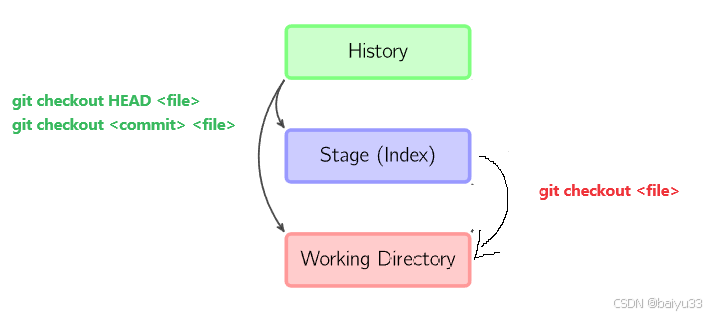阅读量:0
文章目录
1. 目的
git checkout 命令承载了非常多的功能, 想要一次全弄懂,不太现实; 这次白鱼带领大家学习 git checkout <file> 的用法。
老规矩,先查看 git checkout 的文档 :
git help checkout --web 2. 官方文档解释

官方文档的解释很全面,但是也显得很罗嗦,我们先忽略 -f | --outrs | --theirs 等选项, 只关注 git checkout [<tree-ish>] <pathspec> 这个简单的模式:
[<tree-ish>]: 方括号[]表示说这是一个可选字段,-ish意思是“像…一样”,tree-ish意思是树状的,通常是一个 commit, 但是显然也可以是HEAD, 或分支名字, 或 tag 名字。<pathspec>意思是路径
解释:
--是可以省略的- 当没有传入
<tree-ish>时, 也就是git checkout <pathspec>这个模式下,是从 index(也就是 stage 区域)作为源,替换掉 working area 的内容。(绿色框) - 当传入
<tree-ish>时, 也就是git checkout <commit> <pathspec>这个模式下,是从<commit>取得每个文件的内容, 并且替换掉 index(也就是 stage 区域)和 working area 的内容。例如:
git checkout HEAD <file>: 回滚 working area 和 staging area 到当前分支最后一次 commitgit checkout b325c <file>: 回滚 working area 和 staging area 到b325c这次 commit

3. Tower 的解释

Another use case for “checkout” is when you want to restore an old revision of a file:
git checkout 8a7b201 index.html If you specify “HEAD” as the revision, you will restore the last committed version of the file, effectively undoing any local changes that you current have in that file:
git checkout HEAD index.html 